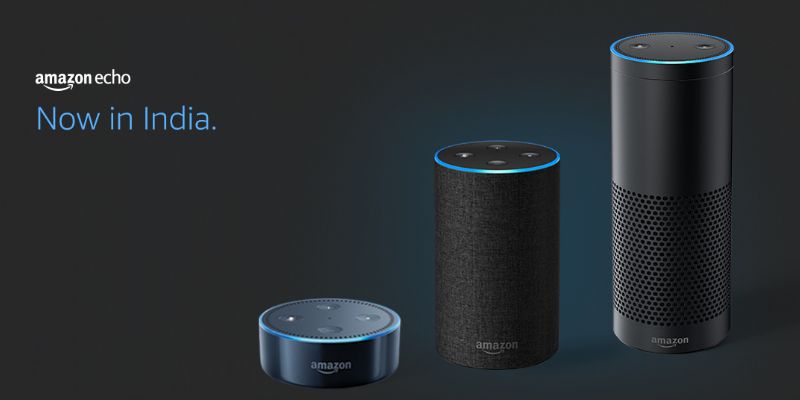Amazon’s Echo has succeeded on its home turf. Can it do the same in India?
Amazon’s conversational assistant Alexa will start shipping in India on October 31, 2017. Alexa has tasted success in the US, but can it succeed in a totally different market, one that is important for Amazon’s global e-commerce ambitions?
All the major tech giants — from Apple and Google to Microsoft and Amazon — have stressed the importance of leveraging artificial intelligence and how it will likely be the core of businesses in the future. As a result, voice-enabled smart conversational agents seem to be the most popular consumer-facing product.
Amazon recently announced that Alexa, the brain that powers Amazon Echo, is coming to India along with three Alexa-enabled devices — Echo, Echo Plus, and Echo Dot. But can Amazon Echo succeed in India? What advantages or disadvantages does it face compared to the US market where it seems to have a firm footing? Let us explore.

Echo around the world
While Amazon hasn’t shared the exact number of Echo devices it sells every year, the company had announced that Alexa devices topped the bestseller list during the holiday season (December 2016) and the company sold millions of devices worldwide. According to a Morgan Stanley report, Amazon sold 11 million devices between mid-2015 and Dec 1, 2016.
The great majority were purchased in the US; the analysts estimate that some 4,00,000 were sold in Germany and 3,00,000 in the UK in that period.
In a statement, Amazon noted that customers in the US, UK, and Germany have left more than 1,00,000 five-star reviews for Echo and Echo Dot. eMarketer notes that while virtual assistants are still far from mass adoption, they are becoming more widely used by Americans.
eMarketer also estimates that with a market share of about 70 percent for 2017, Amazon’s Echo speaker is the most popular player in the space while Google Home will trail behind with 23.8 percent of the market by the end of the year. The remaining portion will be shared among smaller players such as Lenovo, LG, Harman Kardon, and Mattel.

For the above survey, eMarketer defined a voice-enabled speaker as a standalone device whose core functionality is a voice-enabled digital assistant, such as Google Home or Amazon Echo. Hence the report didn’t take into account the wider voice assistant market — which includes Siri, Alexa, Google Now, and Microsoft’s Cortana — which can operate on a wider range of devices like smartphones and tablets. The wider voice assistant market is expected to grow 23.1 percent this year,
Coming back to standalone voice-enabled devices, eMarketer expects Amazon’s market share to fall slightly in the coming years, while Google’s share will grow. But it predicts that Amazon will remain the dominant player in the category for the foreseeable future.
Can Amazon Echo taste similar success in a market like India? While India has adopted e-commerce and cloud computing like many Western markets, is it ready to welcome voice assistants into homes?
What Echo can do and the implications
Echo, Echo Plus, and Echo Dot are powered by Alexa. Amazon notes that since Alexa is built in the cloud and leverages Amazon Web Services, the Alexa Voice Service is always getting smarter and adding more functionality.
“Tens of millions of customers are already using Alexa, and we’re excited to bring her to India with an all-new experience designed from the ground up for our customers in India,” said Dave Limp, Senior Vice President, Amazon Devices and Services. “The combination of Alexa and Echo provides customers with hands-free access to music, weather, news, information, and more — just ask.”
Alexa has the capability to answer questions, play music, read the news, set timers and alarms, check the calendar, provide sports scores, and control lights at home. Echo also has far-field voice control, which lets users control the device even if they are across the room from where Echo is placed.
If consumers have multiple Echo devices within hearing distance, Amazon’s Echo Spatial Perception (ESP) technology intelligently calculates the clarity of your voice and determines which Echo is closest and should respond to the request.
In India, Alexa delivers a customised Indian experience, including an ‘all-new English voice with local pronunciations and intonation’; support for music titles, names, and places in additional non-English languages; local knowledge; and local skills from Indian developers.
Amazon said in a statement,
Third-party developers in India are already building new, localised skills for Alexa, and over 10,000 skills will be available for customers in India, including skills from Saavn, The Times of India, ESPNcricinfo, Ola, FreshMenu, and more.
So Alexa will be able to perform some localised tasks like help book a cab through Ola or help place orders through FreshMenu via voice commands.
Can standalone smart voice assistants match the success of smartphones?
According to a recent TRAI report, there are an estimated 1,186 million wireless subscribers in India. The Indian smartphone market, too, has seen tremendous growth in recent times with strong presence from both premium and budget smartphone brands.
A key point to note, though, is that smartphones, being multi-functional and portable, have become a core part of people’s lives while devices like Google Home and Amazon Echo are for more niche use cases and meant to be stationary in homes. Echo, Echo Plus, and Echo Dot are priced at Rs 4,500, Rs 10,000, and Rs 15,000 respectively. Given the price points, these devices may not see the same mass appeal that smartphones have, at least at this stage.
But that could gradually change. India is a land of many languages and a large percentage of the population that is now coming online for the first time prefers to speak rather than type. A recent Wall Street Journal story highlighted this trend and explored how tech giants are now looking to leverage voice and video to go after the ‘next billion’ internet users that are coming online.
So a voice-powered assistant like Amazon Echo, with its multiple use cases, may find product/market fit among the older generation Z and new internet users who prefer talking over typing.
Amazon Echo’s three variants are expected to start shipping in India from October 31, 2017. It will likely be an important litmus test for Amazon to see the initial response from the diverse set of Indian users spread across the different cities and towns that the company delivers to.
Website: Amazon Echo
Related reads: Amazon India’s real Prime strategy is not the obvious one
A walk through Amazon India’s largest fulfilment centre in Hyderabad











